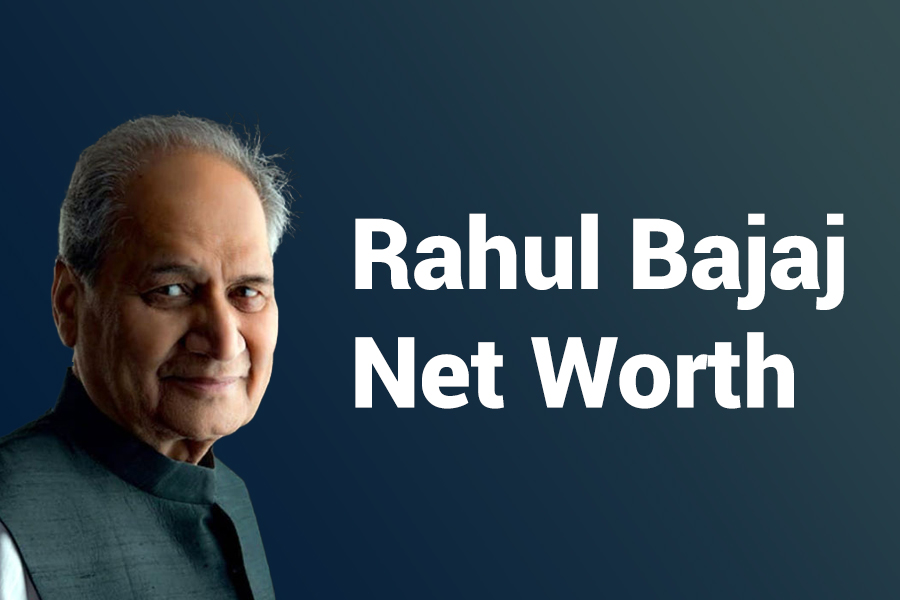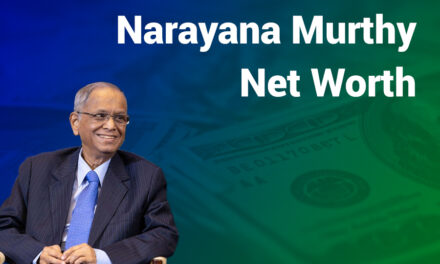Rahul Bajaj, an Indian billionaire industrialist, left a profound mark on the Indian business landscape. Known for his leadership of the Bajaj Group, one of India’s largest conglomerates, his legacy spans across industries from automobiles to finance.
But how much is Rahul Bajaj worth? In this article, we’ll delve deep into his net worth, assets, and the immense impact he had on Indian entrepreneurship.
Early Life and Career
Born on June 10, 1938, in Kolkata, Rahul Bajaj came from a family with a deep business background. His father, Jamnalal Bajaj, was a well-established industrialist and philanthropist.
Rahul followed in his father’s footsteps, making his mark in the family business at an early age. After completing his education in Economics from Harvard University in 1962, Rahul returned to India to take charge of the Bajaj Group.
He took the reins of the company in 1965, and under his leadership, Bajaj transformed from a small firm into a giant in the automotive, financial, and home appliance industries.
With a firm belief in innovation and quality, Rahul Bajaj became synonymous with success, particularly in the automobile sector with the iconic Bajaj scooters.
The Rise of Bajaj Group
The Bajaj Group, founded in 1926, initially focused on manufacturing motorcycles and scooters. Under Rahul’s leadership, Bajaj Auto, the most prominent arm of the group, became a household name. By the 1970s, Bajaj Auto was dominating the Indian motorcycle market. The famous Bajaj Chetak scooter was a symbol of India’s middle class for decades, creating a lasting legacy.
Rahul’s foresight helped Bajaj Auto expand internationally. The company became one of the largest manufacturers of motorcycles and three-wheelers, with a significant presence in several countries. Bajaj’s success wasn’t just confined to automobiles. Over the years, the group diversified into sectors like finance, insurance, and electric vehicles, further cementing its position as a business powerhouse in India.
The Net Worth of Rahul Bajaj
As of his death in 2022, Rahul Bajaj’s estimated net worth stood at US$ 8.2 billion, according to Forbes. This made him one of the richest people in India and a prominent figure in the world of billionaires. His wealth is primarily attributed to his ownership of Bajaj Auto, which remains a highly profitable venture.
Even before his passing, Rahul Bajaj’s wealth had grown substantially. In 2016, Forbes had estimated his net worth at $2.4 billion, showcasing the growth of his empire over the years. The sharp rise in his wealth, particularly in the latter part of his career, can be credited to his keen strategic decisions and ability to diversify.
Breakdown of Rahul Bajaj’s Assets
Rahul Bajaj’s wealth was not only tied to Bajaj Auto but also to other ventures within the Bajaj Group. Let’s explore a breakdown of his key assets:
1. Bajaj Auto:
Bajaj Auto continues to be the key contributor to Rahul Bajaj’s wealth. The company has a market cap of over ₹1.5 trillion (roughly $20 billion), making it one of India’s top automotive manufacturers. Rahul’s stake in Bajaj Auto was substantial, and it formed the core of his net worth.
2. Bajaj Finance:
Bajaj Finance, another significant entity within the Bajaj Group, also contributed to Rahul Bajaj’s fortune. The company has become a leader in consumer finance and wealth management, with a market capitalization of more than ₹5 trillion (around $60 billion). Rahul Bajaj’s stake in Bajaj Finance added a significant amount to his net worth.
3. Other Ventures:
Aside from Bajaj Auto and Bajaj Finance, Rahul Bajaj had significant stakes in other companies, including Bajaj Electricals, which manufactures consumer appliances and lighting products. He also had interests in Bajaj Allianz Life Insurance and Bajaj Hindusthan, a leading sugar producer.
The conglomerate’s diverse portfolio in sectors like banking, finance, home appliances, and insurance ensured that Rahul’s wealth continued to grow over time.
Philanthropy: A True Legacy
Rahul Bajaj’s legacy extends beyond just business. He was known for his philanthropic endeavors, contributing to causes related to education, healthcare, and rural development. The Bajaj Foundation, established under his leadership, has been instrumental in promoting education and providing healthcare services in underprivileged areas of India.
While many business leaders focus primarily on wealth accumulation, Rahul Bajaj recognized the importance of giving back to society. He set up numerous educational institutions and hospitals and supported various charitable causes. His philanthropic actions have continued to benefit millions of people across India.
Family and Succession
After Rahul Bajaj’s passing, the Bajaj Group continues to be helmed by his family. His sons, Rajiv Bajaj and Sanjiv Bajaj, have taken up leadership positions, with Rajiv heading Bajaj Auto and Sanjiv heading Bajaj Finserv. Together, they continue to uphold the values and business acumen instilled by their father.
Bajaj Auto, along with other Bajaj Group companies, remains one of India’s most successful business empires, with an eye on global expansion and sustainability. The family’s collective wealth, combined with their business expertise, ensures that the Bajaj legacy will thrive for generations to come.
The Impact on Indian Industry
Rahul Bajaj’s influence extended far beyond his own companies. He was a vocal advocate for India’s industrial development and played an essential role in shaping the country’s business policies. His leadership skills, vision, and resilience helped build a brand that continues to stand the test of time.
Bajaj was also instrumental in advocating for reforms in the Indian economy, particularly in the areas of taxation and regulations. He frequently spoke on issues relating to the country’s corporate sector, helping bring attention to the challenges faced by Indian businesses.
Leadership and Vision: Rahul Bajaj’s Strategic Decisions
One of the key factors behind Rahul Bajaj’s immense success was his ability to adapt and innovate in a constantly changing business environment. His leadership was defined by bold decisions that steered the Bajaj Group into new markets and opportunities.
For instance, while other companies in India were focusing solely on domestic markets, Rahul Bajaj set his sights on global expansion. Bajaj Auto became a significant player in international markets, with exports to over 70 countries, including several in Africa, Latin America, and Europe. This global vision enabled the company to diversify its revenue streams and reduce its dependency on the fluctuating Indian market.
Rahul’s leadership also saw Bajaj Auto embrace new technologies, including advancements in electric vehicles (EVs). Bajaj Auto, under his guidance, began investing in electric two-wheelers long before the EV trend became mainstream.
In 2018, Bajaj launched the Chetak Electric Scooter, a symbolic move that paid homage to the iconic Bajaj Chetak while looking forward to a more sustainable future. This innovative move positioned Bajaj Auto as a future-ready company, solidifying Rahul’s legacy as an industrial visionary.
Rahul Bajaj’s Role in India’s Economic Reforms
Rahul Bajaj was more than just a businessman—he was also a vocal advocate for India’s economic and policy reforms. As a member of the Indian corporate elite, he often engaged with the Indian government, pushing for reforms that would benefit the country’s industries.
He was a staunch proponent of reducing bureaucratic hurdles and red tape that stifled innovation. During his tenure, he often spoke about the need for a more business-friendly environment. He also advocated for greater corporate governance and transparency, areas that were lacking in many Indian companies at the time. Rahul was instrumental in voicing the concerns of India’s corporate sector, particularly regarding issues like taxation, import duties, and business regulations.
His input helped shape policy decisions that would have lasting effects on the Indian economy. The Bajaj Group’s success was not merely a result of internal strategies but also an outcome of Rahul Bajaj’s advocacy for the corporate sector, his proactive involvement in policy dialogue, and his leadership within industrial forums and associations.
Bajaj Auto: Beyond the Scooter Legacy
Although the iconic Bajaj Chetak scooter became synonymous with the Bajaj name, Rahul Bajaj’s vision took the company far beyond just scooters. Under his leadership, Bajaj Auto became one of the world’s largest producers of motorcycles. The company’s move into motorcycle production, beginning in the late 1970s, was a game-changer for the company.
The Bajaj Pulsar, launched in 2001, marked a major milestone in the company’s evolution. The Pulsar quickly became one of India’s most popular motorcycles, revolutionizing the motorcycle industry with its style, performance, and affordability. Under Rahul’s guidance, Bajaj Auto embraced innovation, which enabled it to compete not only in India but on a global scale, exporting motorcycles to markets in Africa, South America, and Southeast Asia.
In addition, Bajaj Auto expanded its portfolio by acquiring stakes in other motorcycle companies, including KTM of Austria, and entering the electric vehicle market. This diversification strategy ensured the company’s continued growth and helped it maintain its competitive edge in the rapidly changing automotive industry.
Impact on the Indian Workforce
Rahul Bajaj was also deeply committed to the welfare of his employees. While his leadership was often characterized by his sharp business acumen, he was equally known for his commitment to creating a strong organizational culture at Bajaj Auto. He invested in training programs, employee welfare initiatives, and leadership development, ensuring that Bajaj Auto was not just a company, but a community that provided employees with opportunities to grow.
Rahul Bajaj was a firm believer in the importance of having a strong corporate culture. He championed the idea of employee empowerment, always advocating for equal opportunities, fair compensation, and a healthy work-life balance. His leadership fostered loyalty within his workforce, and Bajaj Auto became known for its highly skilled, motivated, and committed employees.
Moreover, his progressive views extended beyond his own company. Rahul Bajaj supported labor reforms in India, advocating for improved working conditions and the rights of workers in the industrial sector. He was an influential voice in corporate India, using his position to push for better standards not just for his company but for the entire industry.
Recognition and Awards
Rahul Bajaj’s contributions to business and industry were widely recognized, both in India and globally. He received numerous awards throughout his career, including the prestigious Padma Bhushan in 2001, one of India’s highest civilian awards, for his contributions to trade and industry.
Additionally, Rahul Bajaj received several honors for his role in driving innovation in the automotive sector. His influence on the industry was acknowledged by peers and competitors alike. He was also known for his mentorship, with many entrepreneurs looking up to him as an example of how to build a successful business empire.
Rahul Bajaj’s achievements were not just confined to financial success. His ability to drive change, innovate, and create lasting impact made him a respected figure in the Indian business community and beyond.
The Future of Bajaj Group
Even though Rahul Bajaj is no longer with us, the Bajaj Group remains one of India’s most valuable business conglomerates. Under the leadership of his sons, Rajiv Bajaj and Sanjiv Bajaj, the Group continues to expand, innovate, and diversify. Bajaj Auto is now venturing into electric mobility, Bajaj Finance continues to dominate India’s consumer finance sector, and the Group is exploring new business opportunities in digital finance, healthcare, and more.
Rahul’s legacy lives on through his children and the businesses he built. The Group’s commitment to innovation, sustainability, and corporate social responsibility ensures that Rahul Bajaj’s vision for the future of business in India will continue to thrive.
Conclusion
Rahul Bajaj’s net worth, estimated at US$ 8.2 billion, was a reflection of his incredible entrepreneurial journey. However, his impact extends far beyond his wealth. Through his leadership of the Bajaj Group, Rahul transformed the Indian industrial landscape, leaving behind a legacy of innovation, business acumen, and commitment to societal progress.
Today, the Bajaj Group continues to thrive, with its ventures spanning multiple industries. Rahul Bajaj’s journey serves as an inspiration to business leaders and entrepreneurs across India and the world. His visionary leadership, combined with his focus on employee welfare, social responsibility, and innovation, ensures that his legacy will endure for generations.










